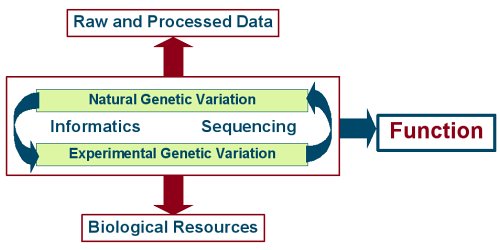Sanger Institute Research Strategy
 The Wellcome Trust Sanger Institute is a world leader in genomic research and in the delivery of high-quality, large-scale resources of lasting value to the global research community. During the coming years, it aims to make a major contribution to the understanding of gene function, similar in impact to its role in genome sequencing.
The Wellcome Trust Sanger Institute is a world leader in genomic research and in the delivery of high-quality, large-scale resources of lasting value to the global research community. During the coming years, it aims to make a major contribution to the understanding of gene function, similar in impact to its role in genome sequencing.
The Institute announced to staff on 7 September its plans to focus its scientific efforts, identifying genetics as the area in which it can make the greatest – and a unique – contribution. This experimental focus will be concentrated on global studies of natural genetic variation in humans and pathogens, and experimental variation of genome sequence in the model organisms, mouse and zebrafish, as well as pathogens.
Genetic studies allow the genome sequence to be connected directly to organismal phenotype. These will yield the richest set of scientific results and resources and capitalize most effectively on the Institute’s unique skills in high-throughput science, sequencing and informatics.
Genetic analysis at the Sanger Institute will cover humans, mouse, zebrafish and pathogens – this breadth of analysis is a strength of the Institute. Moreover, the programmes will develop synergistic and coherent themes: for example, pathogens can be used to probe mammalian gene function, and thus research in pathogen-human interactions will help to prioritise genes to be studied experimentally.
Where we achieve successes in disease gene discovery in human genetics we will seek to develop these findings rapidly by replicating the genetic change in model organisms. The zebrafish and mouse programmes will work together to perform knockouts in parallel in both species.
The vision and scale of our model organism programmes has been recognized by international funding agencies and the Institute has put in place clone resources and other technologies to generate mutants by gene targeting at a very high rate.
 In human genetics, the Institute is already targeting medically relevant genes in conditions such as cancer and metabolic disease. In these studies variation in patient samples is captured and analysis of the same genes in control populations is used to assess disease-associated variation. The Institute also made a major investment in our genotyping capabilities, which are world class.
In human genetics, the Institute is already targeting medically relevant genes in conditions such as cancer and metabolic disease. In these studies variation in patient samples is captured and analysis of the same genes in control populations is used to assess disease-associated variation. The Institute also made a major investment in our genotyping capabilities, which are world class.
The Institute has international recognition and leadership in pathogen genomics. Genetic analysis in pathogen research, for example malaria, will be the overriding consideration, through focused programmes that interrelate to achieve the maximum impact.
The refined strategy is one that fits with the infrastructure of the Institute and will swiftly capitalize on annotated genome sequence. Combining key model organisms, pathogens and human variation, the Institute’s research will use our skills in high-throughput science to bridge between species, yielding rich interpretation of gene function. Integration across research programmes and standardization of data outputs will enhance our rapid delivery of data and resources, empowering the research community globally.
The Institute has led the approach that placing data and resources into the public domain is the most efficient mechanism to speed biomedical research. Our ethos will continue: raw unprocessed data, assembled/curated data and biological resources will be made rapidly and freely available.
Unquestionably, a full compendium of gene function that has been experimentally validated will provide a knowledge base that will identify many new therapeutic avenues for human genetic or infectious disease.
In its 13-year history, the Wellcome Trust Sanger Institute has been a leader in some of the world’s most important biomedical research projects: the Institute’s management and its advisors are determined that the new focus will strengthen our ability to make lasting contributions to the process of transforming genomic research into biomedical understanding.
More information
Selected websites
The Wellcome Trust Sanger Institute
The Wellcome Trust Sanger Institute, which receives the majority of its funding from the Wellcome Trust, was founded in 1992. The Institute is responsible for the completion of the sequence of approximately one-third of the human genome as well as genomes of model organisms and more than 90 pathogen genomes. In October 2006, new funding was awarded by the Wellcome Trust to exploit the wealth of genome data now available to answer important questions about health and disease.
The Wellcome Trust and Its Founder
The Wellcome Trust is the most diverse biomedical research charity in the world, spending about £450 million every year both in the UK and internationally to support and promote research that will improve the health of humans and animals. The Trust was established under the will of Sir Henry Wellcome, and is funded from a private endowment, which is managed with long-term stability and growth in mind.


